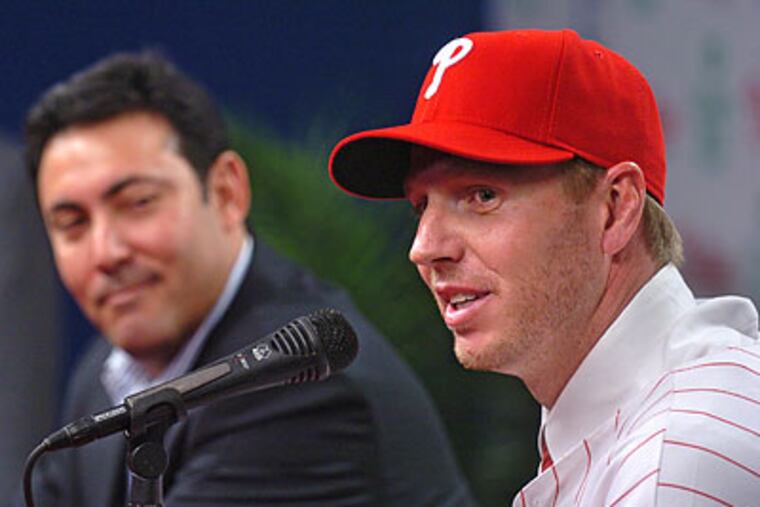Bob Ford: Halladay: Philadelphia is the place to be
If he said it once, he said it 100 times.

If he said it once, he said it 100 times.
In fact, as Roy Halladay was shuttled from the news conference dais to individual standup interviews with all the television and radio stations and then back for another lengthy stretch of questioning, he probably did say it 100 times.
"This is where I wanted to be," said Halladay, who was traded by the Toronto Blue Jays to the Phillies today.
Over and over, the pitcher many call the best in baseball said he only wanted to play for the Philadelphia Phillies.
Put everything else aside for the moment. Put aside how nice it might have been to obtain Halladay and keep Cliff Lee as well. Accept general manager Ruben Amaro Jr.'s explanation that trading Lee to the Seattle Mariners wasn't about the money. It was about getting three raw prospects in return to help restock the farm system.
Fine, take that for what it's worth and then put it aside. Step back and look at the wider canvas. The best players in baseball want to be here.
It wasn't that long ago that players would rather face Randy Johnson without a batting helmet than come to Philadelphia. Big-name players with a choice - the top free agents, the stars who could veto trades or direct them - didn't put the Phillies on the short list of desirable teams. Could you blame them?
The Phils played in a horrifically bad stadium. The artificial turf alone was enough to keep players away. You saw artificial turf, they saw artificial knees somewhere down the road.
As bad as Veterans Stadium was, the team was often worse. Just 10 seasons ago, the Phillies were 65-97 and drew 1.6 million fans. Good players were not demanding their agents somehow get them to Philadelphia.
Well, that was then. After getting a new ballpark, after getting some money to spend, after making a lot of the right decisions with that money, after having some luck, the Phillies have won three straight division titles and made it to the World Series twice in a row.
Suddenly, it's not so bad to be us.
"This is going to give me a chance to go out and achieve the goals I've strived for in this game," Halladay said. "It was an easy decision for me once the opportunity arrived. To be part of this is something I couldn't pass up. There are things in life and in business that are more important, and this is one of them. There are just so many positives for me and my family."
Halladay is a rare player, because he didn't try to squeeze every dollar from what might be the last professional contract of his career. He could have vetoed a traded, played his final season in Toronto and gone out and found a five-year or six-year contract that would net him more than $100 million.
Instead, he took a three-year extension from the Phillies - admittedly, there's nothing wrong with $20 million a year - and put where he played ahead of how long he will be paid. That makes Halladay different from most of the boys in school, but it was a decision he made because he doesn't want to miss out on another postseason in Philadelphia.
"I'd hate to play my career based on where I'd get the most years. I wanted to do it for the right reasons," he said, "and the right reasons were here."
Halladay nearly joined the Phillies at the trade deadline last season, and he watched hungrily as it was Lee who took the ride to the World Series.
"I can't lie," he said when asked if he imagined himself on that mound. "I've had quite a few dreams about it and I look forward to the opportunity of having that chance.
"The older you get and the longer you play, the more important that becomes. You see a team do it back-to-back years, have that success, and it says a lot about the players in the clubhouse and the people putting the team together. It's not an accident. [This organization] is heading in the right direction and I just hope to be a part of it."
So, to review, Philadelphia is where the best pitcher in baseball wanted to play, and where he was willing to take less guaranteed money to do so. How did that happen?
"We're in a great position now and it's a very fortunate position," Amaro said. "There are a lot of great people who helped build this organization to the point where it's a positive destination. That's a great feeling. I think the ball started rolling when we acquired Jim Thome and it progressed from there. Now we're having success and playing in arguably one of the best ballparks in baseball."
It isn't an accident. A lot had to go right, and some of the credit can be spread all the way from Ed Wade to Pat Gillick to Amaro, to the scouting and farm system executives and staff, to the ownership group that bumped the payroll to a competitive level.
Here's the most tangible evidence that it all worked: Roy Halladay, who has won 130 games in the last eight seasons, the most in all of baseball, just wanted to play for Philadelphia. That's worth savoring.
Now, if the Phillies had only kept Lee.